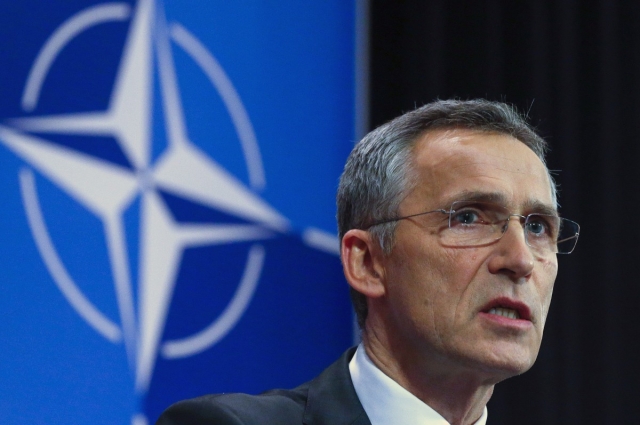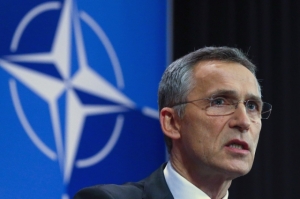NATO and Russia End Contentious Meeting Far Apart on Key Issues
BRUSSELS – For the first time since war broke out in Ukraine in early 2014, the NATO alliance and officials from Russia met in Brussels this week for a lengthy and highly contentious discussion that did little to soothe the mutual loathing between the two sides.
In unusually frank public comments, NATO Secretary-General Jens Stoltenberg blasted the Russian position, saying Moscow rejects any responsibility for overseeing the implementation of the Minsk II Accords that were co-signed by Russia and Ukraine in February 2015.
The agreement was intended as a framework to halt the fighting and find a political solution to a conflict that has killed in excess of 10,000 people and left more than a million as refugees.
The closed-door meeting ran far longer than expected but utterly failed to bridge any significant gaps between the two sides.
"We have profound differences. During the meeting, it was reconfirmed that we disagree on every basic issue when it comes to the facts and narratives regarding Ukraine, particularly when it comes to who was responsible for the crisis" said the Norwegian-born Stoltenberg at a post-meeting press conference.
Russia’s continued violation of the territorial integrity of NATO aspirants Georgia and Moldova reportedly caused several heated discussions between the two sides, but the core bone of contention – as noted by Stoltenberg – continues to be Moscow’s involvement in the ongoing war in eastern Ukraine.
Moscow has claimed since the start of the conflict that it intervened in what it calls a civil war to “defend ethnic Russians in Crimea and eastern Ukraine from Ukrainian nationalists”.
NATO and Ukraine have repeatedly rejected these assertions, saying the Russian-speaking communities of southeastern Ukraine – the overwhelming majority of whom are of either Ukrainian, Russian or Crimean Tatar origin – were under no threat of persecution. Citing on the ground reports from journalists and human rights groups, the West claims that Moscow invaded the country and waged a proxy war against Kiev because of its desire to turn away from Russia’s sphere of influence and integrate with NATO and the rest of Europe.
Stoltenberg was quick to emphasize that “NATO would, under no circumstances, return to a functional relationship with Russia until it returns to respecting international standards of law. But we will keep the channels of communication open.”
By contrast, Russia’s official envoy to NATO, Alexander Grushko, could barely hide his contempt for his counterparts. When exiting the talks he told the media that “there was absolutely no point to the meeting or a positive agenda to build on” before closing his remarks by castigating the West for “arrogance and Russophobia”.
The fraught discussions between the two parties came only days after Russian warplanes harassed US military personnel in the Black Sea.
A Russian Su-24 fighter simulated an attack on a navy destroyer, the USS Donald Cook, while the ship was sailing in international waters on April 11.
Five days later, the US’ European Central Command, which oversees military operations throughout Europe, said that a Russian fighter-interceptor flew within 15 meters of a reconnaissance aircraft and performed “a series of provocative manoeuvres” aimed at intimidating the American pilots.
NATO’s attempt, however, to re-open the regular lines of communication fundamentally severed in the wake of Russia's illegal annexation of Crimea in 2014 appear to have been a one-off that yielded no tangible results aside from a public relations coup for the Kremlin. Moscow will view the meeting as a sign from the West that their attempts to diplomatically isolate and economically punish Russia for its aggressive actions have failed.
"Moscow views its provocative, unpredictable actions and its willingness to risk much more serious incidents than the West as a "force equalizer" — basically a non-linear response to NATO’s military and strategic superiority," said international affairs expert, Vladimir Frolov, in an interview with Russian media.
Russia’s increasingly belligerent actions have deepened the distrust between Moscow and the West and profoundly alarmed NATO’s members in Eastern Europe. Countries in the former Communist Bloc and nascent allies Georgia and Ukraine – both ex-Soviet republics – remain the most exposed to Moscow’s revanchist goal to consolidate power in areas that Russian President Vladimir Putin calls his ‘near abroad’.
Ever since Russia invaded neighboring Georgia in 2008, NATO's eastern members have pleaded with their fellow allies to orient the alliance's defensive posture towards Russia. They have, however, met stiff resistance from NATO’s traditional power base — the US, UK, France and Germany — who fear any move towards an eastern realignment could spark an immediate backlash from the Kremlin.
In an attempt to draw his NATO partners’ attention to the rapidly deteriorating relationship with Moscow, Poland's Foreign Minister Witold Waszczykowski, called a nuclear-armed Russia a greater risk to the West's security than ISIS.
Originally set-up in 2002 to improve cooperation and communication between NATO and Russia, the NATO-Russian Council broke off ties after Moscow’s annexation of Crimea and subsequent intervention in eastern Ukraine. The council was never formally disbanded, but its diplomats had not met, nor even agreed to an agenda for a meeting, for nearly two years.
By Nicholas Waller
Photo: Reuters












